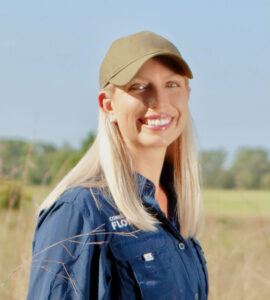By Traci Deen, Conservation Florida
From the sandhills to the swamps, Floridians don’t always agree, but we do find common ground in the actual land we share. It’s a great love of place. It’s part of our ethos, our Floridian ethic.
Conservation connects us, and our love for wild Florida unites us. Some of us are hunters and some are vegans. We have proven it time and again: at the ballots, in our choices, and in our shared heritage — Floridians support conservation.
We swim in crisp, turquoise Florida springs, or in the waters off our coasts. As schoolchildren, we study the Florida panther as a big cat that still roams our most wild places.
We paddle and kayak waterways alongside manatees and dolphins. We enjoy an endless variety of recreational activities on the best public lands in the nation. We eat Florida-grown, Florida-raised food. This is home, and it’s iconic. It’s Florida.

But we also see our coasts battling the tides of a rising sea and our estuaries suffering from algal blooms that destroy entire ecosystems. We ache as panther after panther is struck down on our roads. We lament the loss of green space as another piece of paradise is paved, another ranch lost to rooftops, and we see what’s coming: more of us, more roads, more rooftops.
We know that the time for land protection is now. As Florida grows by nearly 1,000 newcomers each day, we’re projected to exceed 30 million residents by 2060. With this comes a greater demand for water and the development of rural and natural lands for urban use.
We know that how we manage our natural resources over the next 10 to 20 years — what we save and what we pave — will undoubtedly determine Florida’s conservation future, and the future of Florida as a whole. We know that both our economy and our health are rooted in our environment.
I am a big believer that conservation is for everyone and unifies us as Floridians. Don’t believe me? Talk to your neighbors, family, and friends. I’m willing to bet that not one says “Conservation? Yuck. I hate the environment!”
No, instead, we take pride in our home. In 2014, 75% of Florida voters passed the Florida Water and Land Conservation Initiative, intended to restore funding for land protection, including wetlands and forests, recreational lands, beaches and shores, and working farms and ranches.
In late 2020, three Florida counties resoundingly passed ballot initiatives that would cost voters a little more in taxes per year for one united goal: save more land. Floridians don’t view conservation as a partisan issue because it’s not.
Conservation is the sensible, deliberate protection of lands that are necessary to keep our state, its people, and its wildlife healthy and thriving. Land conservation is a no-brainer.
Floridians get that water is the lifeblood of our state and that conservation lands protect our life-sustaining and economy-sustaining rivers, lakes, beaches, and aquifers. The economic benefits of conservation alone make conscientious land acquisition fiscally responsible.
Land conservation is a tool that, if used well, can also keep Florida’s family farms and ranches in business while simultaneously protecting the conservation value of the land. Maintaining green landscapes, wildlife corridors, and open space, while safeguarding food security and the rural communities that are dependent on thriving agricultural operations is a double, or triple win.
Whether you’re an endangered species advocate or guardian of our strong economy, land conservation is the horse to ride for long-term success.
Our shared vision accommodates future population growth while striving to protect Florida’s rich, natural heritage. Florida’s land and water should be defended and Florida’s biodiversity cherished. We have work to do to preserve wild, wonderful Florida.
The 2021 legislative session has begun. If you agree with me, and I know that an overwhelming majority of you do regardless of your age, gender, race, background, and political beliefs, then pick up the phone and call your state representatives and senators and tell them to fund land conservation like the future of Florida depends on it, because it does.
Let’s continue to link arms, Florida, to conserve our common home and our common ground, for the love of Florida, and for her future.
Traci Deen is a sixth-generation Floridian, attorney, and CEO of nonprofit Conservation Florida, a land conservancy working statewide to protect Florida’s natural and agricultural lands.
“The Invading Sea” is the opinion arm of the Florida Climate Reporting Network, a collaborative of news organizations across the state focusing on the threats posed by the warming climate.



